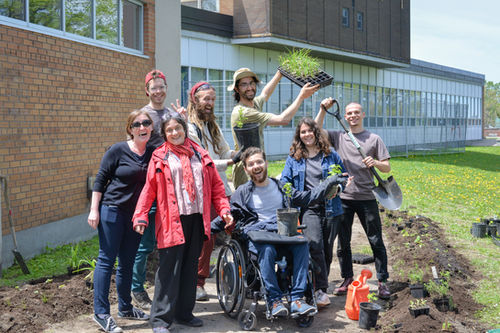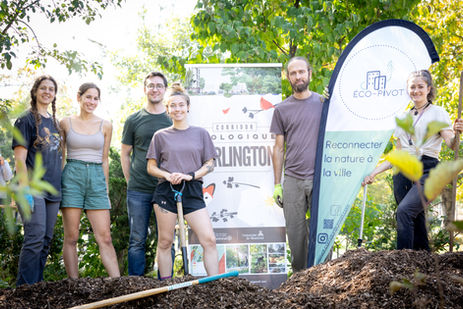.png)
.png)
.png)



Our Journey
In 2012, Alexandre Beaudoin became a biodiversity advisor at the University of Montreal. After two years of working around the university and Mount Royal, he broadened his focus to the entire Montreal area. With the support of landscape architect Marie Le Mélédo, they envisioned an ecological corridor project that would bring a new vision for the city.
In 2014, the University of Montreal’s Sustainable Development Unit, in collaboration with the Côte-des-Neiges-Notre-Dame-de-Grâce borough, launched the Darlington Ecological Corridor project.
A Corridor for Foxes
The idea of an ecological corridor emerged in 2010 when no foxes were recorded on Mount Royal. However, a few years later, foxes were spotted again in this vast but isolated natural area. This discovery raised two questions: How did they get here? How can we assist their movement? Thus, the ecological corridor project began to take shape.

Photo credit: Eric Gagnon, Amis de la montagne
2014
A food forest was planted at the heart of the University of Montreal’s mountain campus, including fruit trees, edible plants, and medicinal plants.
2016
Another food forest was planted at Place Darlington, featuring about 40 fruit trees and shrubs, in collaboration with the Patrouille Verte of the eco-neighborhood group.
A shed was installed by the city to provide the giant pots gardeners with access to water and storage for gardening tools.
In collaboration with students from the Graduate Diploma in Environment and Sustainable Development at the University of Montreal, the Darlington Place construction site was decorated with informative posters about the Corridor's projects.
The second citizen consultation was held at the Faculty of Environmental Design pavilion of the University of Montreal with 12 citizens.
2015
44 giant planter pots were installed along Darlington Avenue, available for citizens to plant fruits, vegetables, and flowers of their choice.
The first citizen consultation on Mount Royal took place at Maison Smith, with 28 participants.
2017
Development of bee-friendly meadows for pollinators on the slopes of Jardin Chateaufort.
Installation of urban furniture and feeding stations on the closed section of Louis-Colin Street.
Development of edible urban agriculture at Place Darlington
Installation of wayfinding signs showing the route of the Darlington Ecological Corridor.
Completion of the 3rd public consultation at the heart of Place Darlington with 42 participants.
2018
In collaboration with civil engineering students from Polytechnique, ecological studies on stormwater management and potential developments along Darlington Avenue were conducted.
Communication students from the University of Montreal created a program to promote citizen participation in urban agriculture through the use of giant planter pots.
A survey was conducted among merchants to identify those interested in managing one or more of these giant planter pots.
2020
Online activities such as mushroom planting and biodiversity-related cooking were offered.
2019
A drawing workshop with a storyteller was held at Place Darlington.
The food forests at Place Darlington were maintained and expanded.
A nectar garden was created at the Gingras-Lindsay Rehabilitation Institute of Montreal (IRGLM).
2021
Citizen activities including mushroom planting and the annual BBQ resumed.
Various activities were provided for teenagers in the C-Vert program.
2022
A grant was received from the Metropolitan Initiatives and Outreach Fund to start the Inari project with MultiCaf.
A pilot project on corridor governance was launched in collaboration with Les Amis des Parcs and the Urban Ecology Center.
2024
Launch of the Habitat in My Backyard program to optimize the planting of native species in private spaces.
Organization of the first Biodiversity Festival at the racetrack to celebrate the Corridor's 10th anniversary.
Presentation of the Corridor at the High Line Network in Detroit.
2023
A food forum was organized in collaboration with MultiCaf and the borough to deploy the new Community Food Development Plan.
The first micro-forest of 600 trees was planted at Mahatma-Gandhi Park with about 50 volunteers.
2025
We have another great year in store for you!




